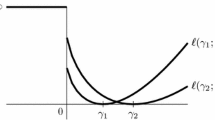Abstract
We consider a discrete-time model where multiple queues, each with its own exogenous arrival process, are served by a server whose capacity varies randomly and asynchronously with respect to different queues. This model is primarily motivated by the problem of efficient scheduling of transmissions of multiple data flows sharing a wireless channel.
We address the following problem of controlling large deviations of the queues: find a scheduling rule, which is optimal in the sense of maximizing
where Q i is the length of the i-th queue in a stationary regime, and a i >0 are parameters. Thus, we seek to maximize the minimum of the exponential decay rates of the tails of distributions of weighted queue lengths a i Q i . We give a characterization of the upper bound on (0.1) under any scheduling rule, and of the lower bound on (0.1) under the exponential (EXP) rule. We prove that the two bounds match, thus proving optimality of the EXP rule. The EXP rule is very parsimonious in that it does not require any “pre-computation” of its parameters, and uses only current state of the queues and of the server.
The EXP rule is not invariant with respect to scaling of the queues, which complicates its analysis in the large deviations regime. To overcome this, we introduce and prove a refined sample path large deviations principle, or refined Mogulskii theorem, which is of independent interest.
Similar content being viewed by others
References
Andrews, M., Kumaran, K., Ramanan, K., Stolyar, A.L., Vijayakumar, R., Whiting, P.: Providing quality of service over a shared wireless link. IEEE Commun. Mag. 39(2), 150–154 (2001)
Andrews, M., Kumaran, K., Ramanan, K., Stolyar, A.L., Vijayakumar, R., Whiting, P.: Scheduling in a queueing system with asynchronously varying service rates. Probab. Eng. Inf. Sci. 18, 191–217 (2004)
Bender, P., Black, P., Grob, M., Padovani, R., Sindhushayana, N., Viterbi, A.: CDMA/HDR: A bandwidth efficient high speed wireless data service for nomadic users. IEEE Commun. Mag. (July 2000)
Bertsimas, D., Paschalidis, I.C., Tsitsiklis, J.N.: Asymptotic buffer overflow probabilities in multiclass multiplexers: an optimal control approach. IEEE Trans. Automat. Control 43, 315–335 (1998)
Dembo, A., Zeitouni, O.: Large Deviations Techniques and Applications, 2nd edn. Springer, Berlin (1998)
Ethier, S.N., Kurtz, T.G: Markov Processes: Characterization and Convergence. Wiley, New York (1986)
Feller, W.: An Introduction to Probability Theory and its Applications. Wiley, New York (1950)
Freidlin, M.I., Wentzell, A.D.: Random Perturbations of Dynamical Systems, 2nd edn. Springer, Berlin (1998)
Rockafellar, R.T.: Convex Analysis. Princeton Univ. Press, Princeton (1970)
Shakkottai, S., Stolyar, A.L.: Scheduling for multiple flows sharing a time-varying channel: the exponential rule. In: Suhov, Yu.M. (ed.). Analytic Methods in Applied Probability. In Memory of Fridrih Karpelevich. American Mathematical Society Translations, Series 2, vol. 207, pp. 185–202. American Mathematical Society, Providence (2002)
Shakkottai, S., Srikant, R., Stolyar, A.L.: Pathwise optimality of the exponential scheduling rule for wireless channels. Adv. Appl. Probab. 36(4), 1021–1045 (2004)
Stolyar, A.L., Ramanan, K.: Largest weighted delay first scheduling: large deviations and optimality. Ann. Appl. Probab. 11, 1–48 (2001)
Stolyar, A.L.: Control of end-to-end delay tails in a multiclass network: LWDF discipline optimality. Ann. Appl. Probab. 13(3), 1151–1206 (2003)
Stolyar, A.L.: MaxWeight scheduling in a generalized switch: state space collapse and workload minimization in heavy traffic. Ann. Appl. Probab. 14(1), 1–53 (2004)
Stolyar, A.L.: Dynamic distributed scheduling in random access networks. J. Appl. Probab. 45(2) (2008, to appear)
Stolyar, A.L.: Large deviations of queues under QoS scheduling algorithms. In: Proceedings of the 44th Annual Allerton Conference, September 2006
Venkataramanan, V.J., Lin, X.: Structural properties of LDP for queue-length based wireless scheduling algorithms. In: Proceedings of the 45th Annual Allerton Conference, September 2007
Viswanath, P., Tse, D., Laroia, R.: Opportunistic beamforming using dumb antennas. IEEE Trans. Inf. Theory 48(6), 1277–1294 (2002)
Ying, L., Srikant, R., Eryilmaz, A., Dullerud, G.E.: A large deviations analysis of scheduling in wireless networks. IEEE Trans. Inf. Theory 52(11), 5088–5098 (2006)
Author information
Authors and Affiliations
Corresponding author
Rights and permissions
About this article
Cite this article
Stolyar, A.L. Large Deviations of Queues Sharing a Randomly Time-Varying Server. Queueing Syst 59, 1–35 (2008). https://doi.org/10.1007/s11134-008-9072-y
Received:
Revised:
Published:
Issue Date:
DOI: https://doi.org/10.1007/s11134-008-9072-y
Keywords
- Queueing networks
- Dynamic scheduling
- Sample path large deviations principle
- Refined Mogulskii theorem
- Local fluid limit
- Time-varying server
- Quality of service
- Exponential (EXP) rule




